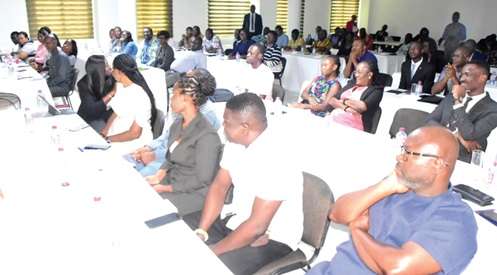The government is considering implementing surcharges on institutional heads or chief executive officers (CEOs) who fail to address audit queries or treat them with contempt. This measure is aimed at ensuring accountability and proper financial management within public institutions.
Regardless of who handles or responds to audit queries on behalf of an institution, it is ultimately the principal spending officer or CEO who will bear the cost. This announcement was made by Samuel Gyekye-Mensah, Deputy Director in charge of Technical, Research, Monitoring, and Evaluation of the Internal Audit Agency, during a two-day “awakening workshop” held for CEOs, audit committee chairpersons, and internal auditors.
“Some of such CEOs don’t even bother to read their audit reports until they appear before the Public Accounts Committee of Parliament or EOCO (Economic and Organised Crime Office), and are found wanting.”
Mr. Samuel Gyekye-Mensah
Mr. Gyekye-Mensah highlighted a significant issue in current practices where audit queries are often left to junior officers, despite the ultimate responsibility lying with the head of the institution.
The workshop aimed to equip participants with the necessary skills to respond effectively to audit queries and to prepare comprehensive “working papers.” These papers are essential for defending audit reports in court, ensuring that even in the absence of the original preparers, lawyers can rely on them to challenge findings or address issues.
Mr. Gyekye-Mensah urged CEOs to take a proactive approach to audit reports and to provide timely and appropriate responses to any queries raised. “Audit should be seen as a tool and not a weapon,” Mr. Gyekye-Mensah stated.
Mr. Gyekye-Mensah explained that when an internal auditor raises an issue, such as the presentation of an incomplete payment voucher, it should not be viewed as an attack but as an effort to ensure proper procedures are followed.
Mr. Gyekye-Mensah also addressed the misconceptions surrounding the role of internal auditors. He noted that CEOs might not be familiar with all the laws governing the operations of the Audit Service. The auditor’s role is to assist by providing the necessary tools and information, which should be seen as a collaborative effort rather than a threat.
Promoting Harmony in Management

Dr. Eric Oduro Osae, Director-General of the Internal Audit Agency, echoed the sentiments of Mr. Gyekye-Mensah and emphasized the need for management bodies to embrace audit reports to foster a harmonious working environment.
“And some of the recommendations are practically impossible to implement. We need to look at this critically. “
Dr. Eric Oduro Osae, Director-General of the Internal Audit Agency
Dr. Osae further stressed the importance of focusing on two critical aspects: the quality of working papers and the management’s response to audit queries. These elements, he argued, have a substantial impact on the effectiveness of the audit process and the overall functioning of the institution.
To address these issues, the workshop provided detailed guidance on how to generate robust working papers and respond adequately to audit queries. Participants were trained on best practices for documenting financial transactions and preparing for potential legal challenges. The goal is to ensure that institutional heads and CEOs are fully prepared to defend their financial management practices and maintain transparency.
The government’s move to impose surcharges on non-compliant institutional heads and CEOs is a significant step towards enhancing accountability and transparency within public institutions. By ensuring that the principal spending officers are held accountable, the government aims to improve financial management and reduce instances of mismanagement and corruption.
The workshop conducted by the Internal Audit Agency is a crucial initiative in this regard, providing necessary training and raising awareness about the importance of audit compliance. It is hoped that with these measures in place, institutional heads and CEOs will take a more proactive role in addressing audit queries and maintaining the integrity of their financial operations.
The ultimate goal is to create a culture of accountability where audits are seen as tools for improvement rather than as punitive measures. This cultural shift, combined with the potential financial consequences of non-compliance, is expected to lead to more responsible and transparent management practices across public institutions.
READ ALSO: Pro-Palestinian Protest Disrupts Australia’s Parliament























